- Home
- About Us
- Join/Renew
- Member Benefits
- Member Pages
- Log In
- Help
- Museum Store
The top bearing is a made up component. The lower one is disassembled and shows the 40 rollers, housing and 2 snap rings.
You remove the snap rings and the .12565″ OD x .865″” long rollers fall out.
They all checked out ok and will be cleaned and reused.”
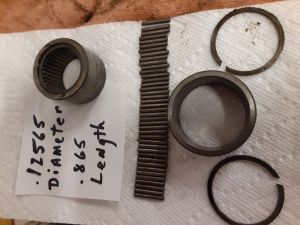
The parts list on this site identified the correct seals. I was able to source all but one of them, by those numbers.
The 50695/450695 I couldn’t find but it crossed over to a CR11776 for $11 on Ebait. Only difference is the depth is about half which may cause a problem with bearing retention.
I also found a common trailer bearing seal for a buck and change and it looks like it will work as it is a double seal but the ID is slightly larger. National 470706.
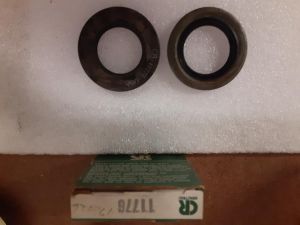
Starting on the brake case. I decided to clean it by hand which does a couple things, gives an opportunity to inspect thoroughly, you notice things like casting marks, part numbers, other details and it gives you a calming activity for listening to music, smoking a cigar or having a beer or cocktail.
I used Easy Off oven cleaner, no fume version in lemon scent to degrease everything. Spray it on, wait till it starts to show signs of the grease running, only a couple minutes, and wipe off with a paper/cloth towel. For the heavy deposits I used a couple of small flat and angled wood carving chisels and a dental pick.
Next, to remove the brake yoke seals and bearing, I used a long screwdriver to drive them out coming the opposite side or from the inside out. Be sure to drive the bearing out using the rim of the bearing, for soon to be obvious reasons.
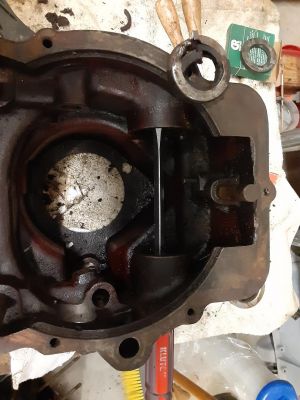
Miles thanks for the lead. I used to do a lot with Bearings Inc.
I found this SKF seal finder and it is great.
Peter,
That stuff is pretty cool. Thanks.
Bill
Dave,
Ok, thanks again for your help.
Bill
Jim,
Great tip. Just what I was looking for. Now if I can just find a paper grocery bag.
Thanks,
Bill
Dave,
I saw the Ramgaskets and their 2.5mm is probably close enough. Hat to go to the UK if I can find it here.
Thanks
Bill
Lastly, to remove the shift fork you have to remove an Allen head set screw visible thru on of the top holes. Shaft pulls out and then you can remove the fork and spring. Don’t forget to remove the detent oval above. I used a magnet. Getting it back in will be tricky.
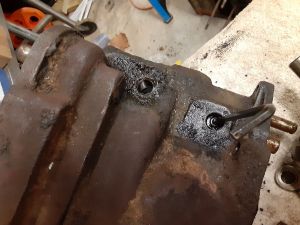
Remove the cover on the front of the case that covers the 2 actuation rods.
There is another elongated check pin between the rods so you have to have the detent on one lined up with the pin before you can pull the other.
Once one is out the other can be removed. The pin prevents both rods moving at the same time.
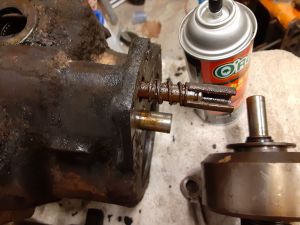
Remove the pinch bolt, it is piloted, which allows you to remove the freewheeling actuation lever/ It pulls out.
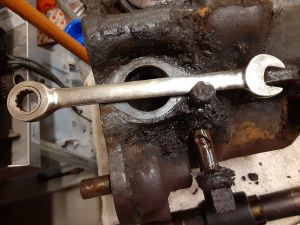
Here is a better picture of the caged roller bearing and the selector fork.
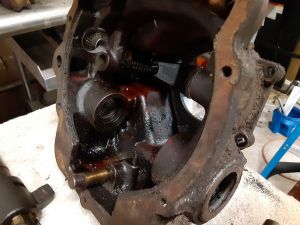
Here are the shaft/fork assemblies and the output/input shafts and there retainers along with the input shaft and selector gear.
If you look inside the case you can see the selector fork that engages the gear
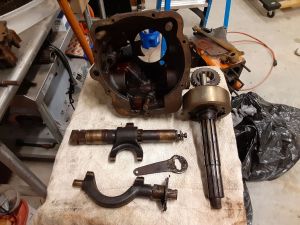
From this side you can see the seal and needle bearing that the shaft rides on. These may be a problem.
If you look below the hole you will see another shaft. It has a t2 bolt retainer that I removed to get to this point. To get this fork out you have to drive the bushing it rotates in from the inside of the case. Thad give you enough room to remove the fork.
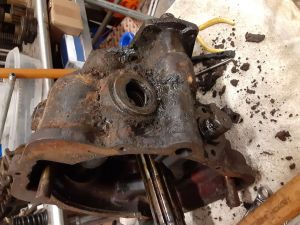
To finish disassembling the freewheeling section, Unbolt the spring lever arm from the lower shaft, replace with a longer bolt. Remove the double yoke that actuates the brake cables by removing the cotter pin secured pin and lift it off the shaft. There was a lot of play in this assembly.
Drive the shaft, using the inserted bolt, thru the splined fork and the case. Note alignment. Remove the fork and reassemble so you don’t forget the orientation. I can see nothing to do with these parts but clean and reinstall.
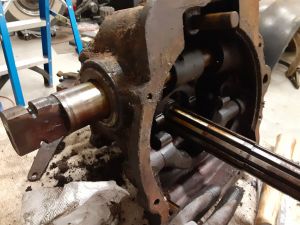
This is the end of the freewheeling that mates to the gearbox. Notable items are the hub in the center of the shaft has a shift fork on the right. It runs in a groove on the ring behind it. I moved the hub so you can see the fork.
To the right are 2 shafts that are connected and have to do with locking out or in the freewheeling.
If you look in the right upper corner, there is a square block with a hole in it. As it rotates it lifts a pin that blocks the movement of one of those shafts. It is the freewheeling cable attachment point. It rotates and rises as the cable is pulled out.
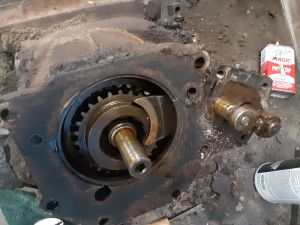
And this is the mating end of the freewheeling unit that slides into the end of the previous pic.
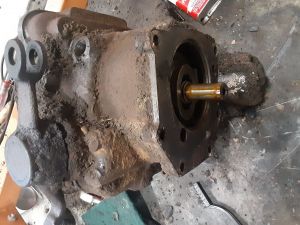
This is the output shaft from the transmission.
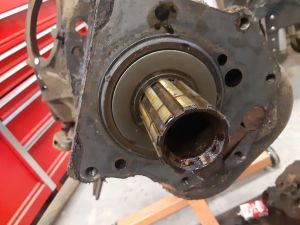
Next is the freewheeling unit. Six bolts, one is kind of hidden and you must remove the top filler plug to get one out. Case just slides off although clearance is tight.
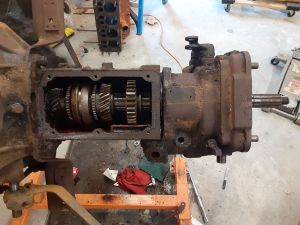
Dave,
Thanks, I have them on CD. I will check them out.
Bill
